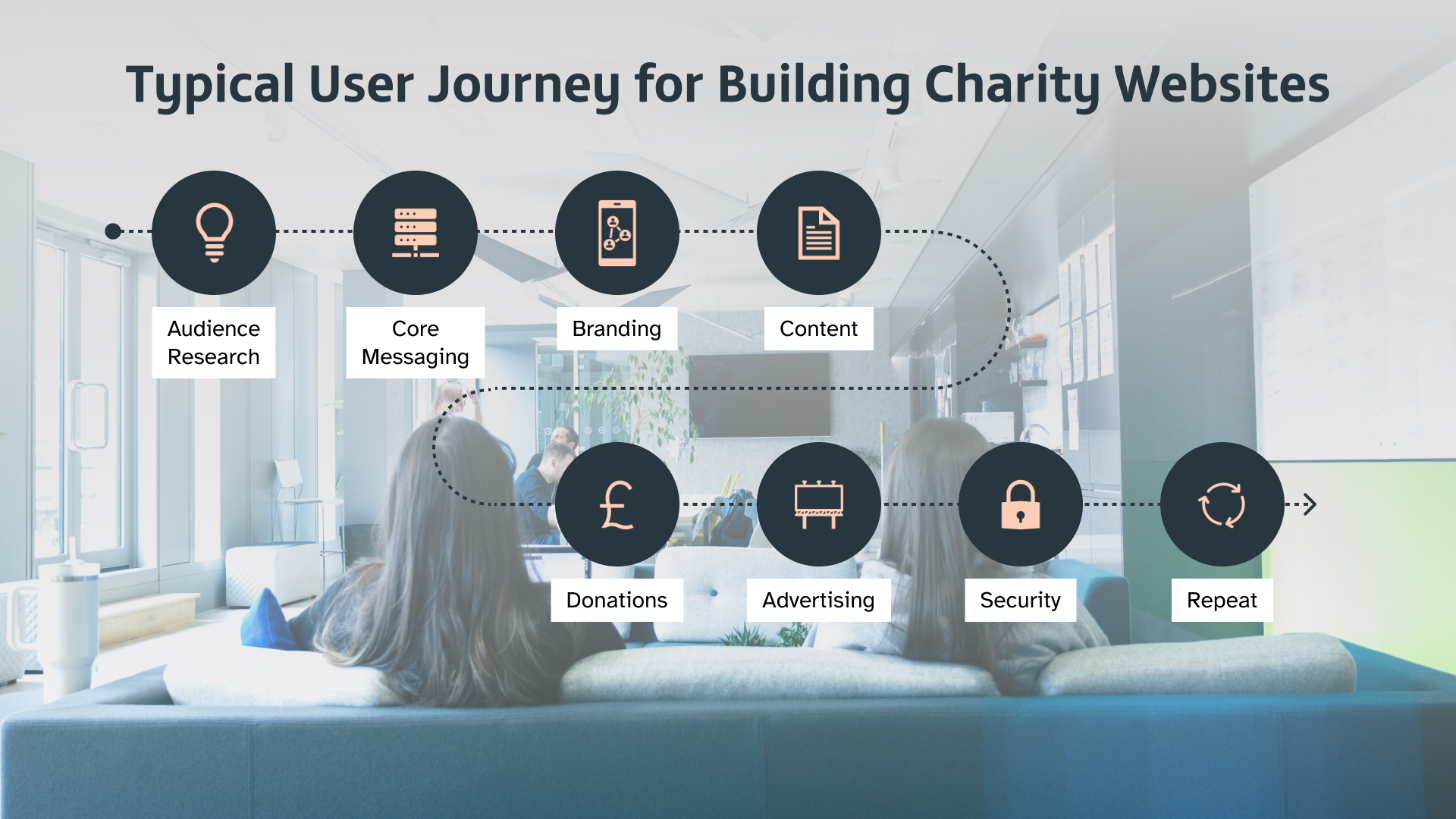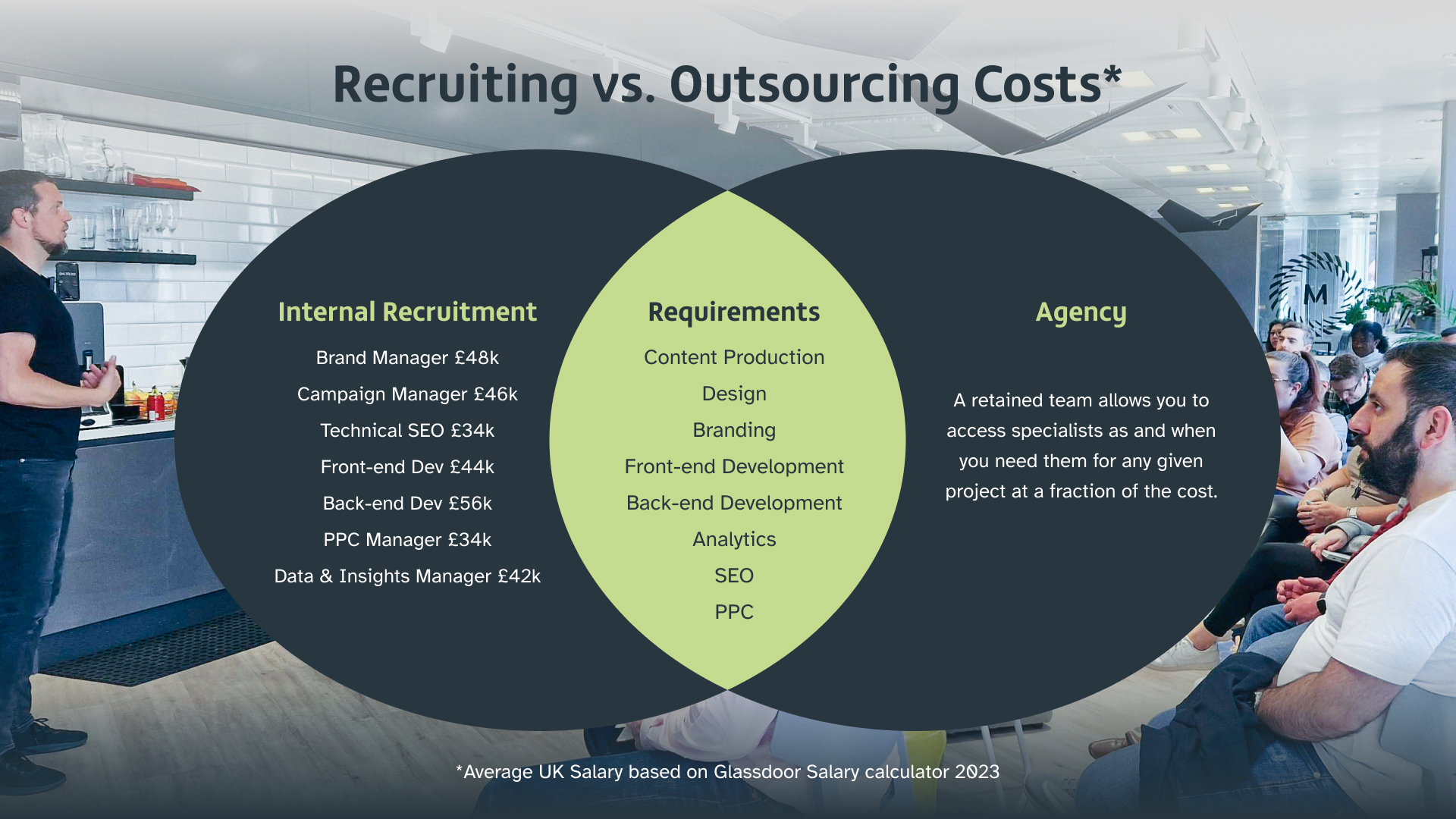The benefits of outsourcing when struggling to hire digital talent
Written by Scott Rumsey
Brands and businesses are experiencing greater ‘pain’ when it comes to delighting customers, reducing waiting times for digital deployment and staying ahead of the competition than ever before.
With an ever-changing set of digital targets and key performance indicators (KPIs) to measure against the need to invest in order to hit (and exceed these targets), has never been more prevalent.
All of this means that there are a wide number of entry points for those looking to meet the needs of their audience – and indeed expand this audience. In order to successfully scale and optimise your online offering there are a wide variety of employees needed to manage any changes. These can come in the form of costly recruitment hires or by working alongside an agency, where there is already the required talent and skill set to develop your offering and address 'digital pain points'.
Enterprise-sized businesses are looking to reduce the cost to service their customers, release timely and more importantly, useful information and are focused on scaling their offering quickly and securely. When looking at the speed of new integrations, what used to take months and years can now be done in short, well thought out sprints, delivering greater value consistently. It is for this reason that so many in the industry are looking to move away from ad-hoc projects to a more defined, long-term strategic viewpoint.
This is something that has been backed up by Gartner in a report around the reasons CFOs need to continually evaluate their digital investments. The report said: “Historically, IT delivery was performed through projects, defined by a detailed, well-planned-out approach designed to achieve one or more desired benefits or outcomes. For example, the goals of implementing an enterprise resource planning (ERP) project are to lower costs and secure faster time-to-deliver goods to customers. However, it often takes a while to realise quantifiable value from such large-scale initiatives.
“In a digital business, waiting months for project delivery milestones, especially in the design phase, could mean the difference between winning the hearts and minds of your customers and losing your market share to a competitor that does.
“Product-centric delivery, by contrast, empowers product teams to explore and deliver outcomes incrementally — as software engineers do by releasing software updates. This allows teams to pivot more quickly based on new conditions in the market, customer preferences or priorities.”
Companies, especially charities, operating in the digital ecosystem, and who rely on their online platform as their main revenue or information stream, often struggle to determine where their money, efforts and expertise are best spent. They also find it hard to prioritise one line item over the other and don’t have to resource profile to pivot. It is for this reason that there are so many benefits to choosing an agency to support and supplement a digital vision.
According to Forbes: “Digital continues to be the best spend with the greatest ability to prove ROI. Businesses should be encouraged to focus on their current clients and growing loyalty with their current customers as it’s much easier to grow accounts than to gain new accounts.
An agency partnership will not only allow you access to a wider pool of specialists but means that you’ll be able to do more - with less.
Here at Mando, we see daily changes in the way businesses evolve their digital products and services. We’ve also noticed a huge mentality shift in terms of wanting to move from one-off projects to a more continuous, agile approach, looking at iterative design and builds across the offering not just in the area the businesses feel they can currently invest.
If a business needs to be able to bring in team members who are aligned technically and culturally but who also have the skills to pivot as their needs change, then they are essentially looking for a ‘unicorn’ – working with a retained team or an agency in a fluid, agile way allows greater control and better focusing of the aforementioned investment.
If we are to look at one of the key sectors that we have operated in over the years – charity – it is clear to see that a product-focused strategy is far more beneficial than recruiting one specialist.
At Mando, we have historically aligned specific individuals to client engagements within the charity sector, who then become familiar with a business’s solution at any given point. Some of the highlights that we have in this sector include looking holistically at service design across digital estates and operating models. We have used best-of-breed technology and expert insights to smooth out the user journey and provide digital roadmaps for future development and growth.
This is a major plus because they won’t get passed around by a team unfamiliar with their offering/solution or have to deal with offshore developers.
So, while there is the same onboarding effort, as with a new employee - if they think longer-term – rather than a specific project or product that those developers will be aligned to – it is easier to ramp up and down production depending on requirements.
Charities often have a large number of touchpoints and there is an array of reasons why somebody may need to use the website. Hiring an agency can help to balance the load and ensure not only that the site runs smoothly but that it is secure and offers the best user experience (UX).
If you think about the aims of a charity website and the user journey for one of their websites, then you are looking at something like this...

Based on the above journey it is essential that you consider all of the possible roles you will need to recruit for and the touchpoints that these practitioners will need to address.
At its core, a charity website might have several different reasons for existing, from the obvious, such as marketing the brand to as wide an audience as possible, and being intentional about messaging and social media, to running time-sensitive campaigns and updates. In order to perform these tasks, you may need a branding expert, social media executive and a campaign manager.
When it comes to operating a CMS or DXP that will allow content to be published quickly and easily to update that audience then you will need copywriters and content marketers.
Technical SEOs are required to ensure that the backend of the CMS is performing effectively, especially in a crowded marketplace where businesses are vying for donations and exposure. Being on page one of Google can be the difference between increased revenues and around a 90% drop-off on page two.
For advertising – especially paid ads then a PPC manager is required.
To build out functionality around secure payments for donations and online portals for those wanting to see where their money is being spent, developers are required. The same can be said for eCommerce projects.
Once you have done all of the above, you’ll want to both learn from the initial work and report back on the effectiveness of campaigns. The need for analytical experts is therefore high.
Why are we telling you this? Well, typically those working in the roles required for maximum productivity and development can take several weeks to recruit, then you will often find that there is a three-month notice period for those recruits to be able to join your business. When you add in the time to onboard and launch your projects it could be that you have wasted around six months – more than enough time to fall behind the competition.
Below are some of the typical average costs of filling the roles you would need versus paying a retained fee for a full agency team.

A retained team that can lean on several if not all of these areas is therefore much more cost-effective and means that more of the donations can be spent assisting those most in need.
We published a whitepaper that covered the importance of people and one of the key stats was that it’s estimated there will be a skills gap equating to 3 million technology jobs by 2025, with more than 2 million of them in software development roles.
That’s a challenge for companies looking to invest in skills because what might be in vogue today could be redundant tomorrow. It requires continuous training and development to keep up because no one can predict what the software development languages of tomorrow will be.
Working with an agency takes away much of the pain in this area as there is more likely to be a full set of technical experts in a dedicated organisation and a staff base that is continually looking at trends to stay ahead of the curve.
If this, or any of our other insights have piqued your interest and you’d like to discover how you can get on the road to digital transformation, why not book a call with one of our experts?
What else is going on
-
June 2024
Understanding Google’s Consent Mode and Enhanced Conversions
Get conversion data in a privacy-safe way. We explain Consent Mode and Enhanced Conversions in GA4, and setting them up to avoid losing conversion data.
-
June 2024
Meet the team – Simon Royall – Test Analyst
Meet Simon Royall, our Test Analyst. Discover his role, achievements, and how he leverages automated testing to enhance digital product quality at Mando.
